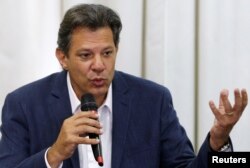Far-right candidate Jair Bolsonaro said on Monday he would stick to tough rhetoric in the second round of Brazil's bitterly contested presidential election, after his strong win in first-round voting sent financial markets soaring.
Bolsonaro, a former Army captain and veteran lawmaker, nearly won the presidency outright on Sunday, taking 46 percent of votes against leftist Fernando Haddad's 29 percent -- part of a dramatic swing to the right in Latin America's largest nation.
As neither candidate won an outright majority, Bolsonaro will face Haddad, the former mayor of Sao Paulo representing the Workers Party (PT), in an Oct. 28 second-round vote.
Some Bolsonaro supporters called on him to moderate his message to ensure victory, but the candidate said he would stick to hardline rhetoric on crime and corruption that has resonated with voters. The world's fifth most populous country has been roiled by years of rising crime, recession and graft scandals.
"I can't turn into a Little 'Peace and Love' Jair, which would be betraying who I am," Bolsonaro said in a radio interview. "I have to keep being the same person."
His words were a thinly veiled swipe at former President Luiz Inacio Lula da Silva, who dropped his fiery leftist rhetoric to win the presidency in 2002, dubbing himself the 'Peace and Love' candidate.
Lula, who founded the Workers Party and was president until 2010, is serving 12 years in prison for a bribery conviction.
Reflecting confidence that he will win the second round, Bolsonaro said he had already begun talks with other lawmakers in Congress to build an eventual governing coalition. That raised expectations of swift, market-friendly reforms.
Brazil's benchmark Bovespa stock index jumped 4 percent, led by double-digit gains by state-led oil company Petroleo Brasileiro SA and state power companies, which Bolsonaro advisers have said they will privatize.
Markets have cheered Bolsonaro's advance toward the presidency since his recent conversion to free-market ideas under the tutelage of University of Chicago-trained economist Paulo Guedes. Signs that Bolsonaro could win enough support in Congress to push through his agenda added to enthusiasm.
"Part of the market's excitement comes from the renovation in Congress. Regardless of party, that renovation provides hope," said Pablo Syper, head of trading at Mirae Asset Global Investimentos.
Bolsonaro's popularity surged as exasperated Brazilians decided he represents the best chance to turn back a wave of violent crime and dismantle what prosecutors call the world's largest political graft scheme.
But his track record of fiery anti-democratic rhetoric, calls for police to kill as many criminals as possible and opposition to legalizing abortion and gay marriage have put others on edge.
'Not Him'
Former Ceara Governor Ciro Gomes, who split with the PT and garnered 12 percent of first-round votes with his center-left presidential campaign, stopped short of endorsing Haddad for the second round but said he would "fight to defend democracy."
Asked whom he would endorse, Gomes referred to the slogan of anti-Bolsonaro protesters in recent weeks: "Not him, certainly."
With the field reduced to two candidates, some analysts see Haddad as the natural inheritor of many of the centrist votes that will be up for grabs. But the scale of Bolsonaro's first-round success means that Haddad will have little room for maneuver.
Political analysts said that to have a chance of winning the runoff, Haddad would need to move hard to the center, distance himself from his political mentor and denounce the corruption that flourished during his party's 2003-2016 run in government.
At a news conference on Monday, Haddad cast the second round as pitting Bolsonaro's "neoliberalism" against the social programs that the PT has promoted. He did not offer concrete policy concessions for potential allies.
Alliances in Congress
Brazil's next Congress was also elected on Sunday, and in a seismic shift, Bolsonaro's Social Liberal Party (PSL) was set to become the second-largest force in the legislature.
The party would still need alliances to push Bolsonaro's socially conservative policies and free-market reforms through Congress, which was even more deeply fragmented after Sunday's election.
Thirty parties won seats in the lower house, up from 25 represented there before the vote.
The acting president of the PSL, Luciano Bivar, told Reuters he expected to attract lawmakers converting from other parties, expanding the PSL's ranks to overtake the PT as the largest party in the lower house.
"We're going to have a huge caucus, perfectly governable, to pass the bills that the society is demanding -- to conclude the reforms that are underway," Bivar said, referring to stalled efforts to trim public pensions and close a budget deficit.
Congressman Onyx Lorenzoni, the main political advisor to Bolsonaro, said his team was targeting individual lawmakers in parties opposed to the PT - including those in parties whose leaders do not yet support the right-winger.
"We'll speak with anybody who wishes to talk with us now, which is interesting because many of them did not want to have a dialogue with us before the first-round vote," Lorenzoni said.






